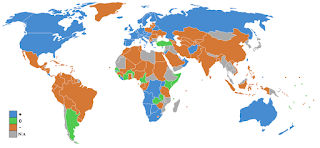
From the web site of
The Stanford Technology Law Review (STLR):
Submitting to STLR
Articles, Book Reviews, and Working Papers
The Stanford Technology Law Review (STLR) publishes Articles, Notes, and Perspectives which address critical issues at the intersection of law, science, and technology. STLR accepts submissions by students, scholars, practitioners, and advocates.
In exchange for STLR's best efforts to retain the author's style throughout the editing process, authors should submit complete, fully-cited works. Submissions are carefully reviewed through a blind process by members trained in the relevant areas of law, science, and technology. STLR considers requests for expedited review on a case-by-case basis.
Policies and Procedures
STLR accepts three types of submissions:
* Articles: Articles are academic writings which discuss and analyze an original legal issue or problem. STLR considers Article submissions of all lengths, but gives preference to Article submissions of fewer than 30,000 words.
* Notes: Notes are academic writings by students or recent students which discuss and analyze an original legal issue or problem. As with Articles, preference is given to Note submissions of fewer than 30,000 words.
* Perspectives: Perspectives are academic writings that are centered around an analysis or critique of a recent case, piece of legislation, law journal article, or law-related book. Perspectives are significantly shorter than Articles and Notes.
Please clearly designate whether the submission should be considered as a Feature Article, a Book Review, a Working Paper, a Note, or a Perspectives piece.
STLR accepts all submissions electronically via email or Expresso. Email submissions should be sent to one of the following addresses based on the type of submission: stlr-articles@lists.stanford.edu
stlr-notes@lists.stanford.edu
stlr-perspectives@lists.stanford.edu
Submissions must be accompanied by the author's name, address, telephone number, and email address. The author should also include a resume, a letter of introduction, and a short abstract (not more than 250 words). Please format citations in accord with the latest edition of The Bluebook: A Uniform System of Citation.
For more information, please contact stlr-submissions@lists.stanford.edu
**
Image: wikipedia, travel technology -- the wheel; 4000 B.C.,
Cart wheel on display at The National Museum of Iran, at Tehran.


_logo.jpg)












